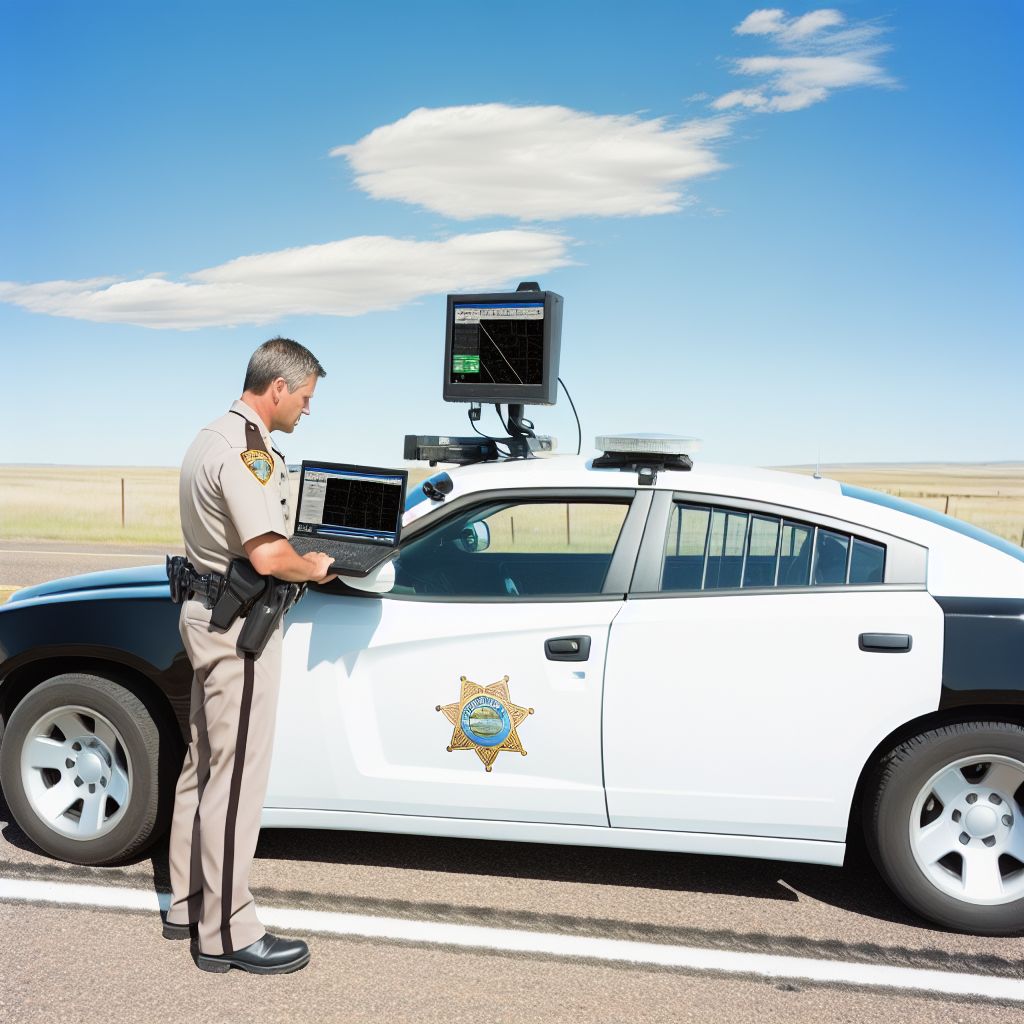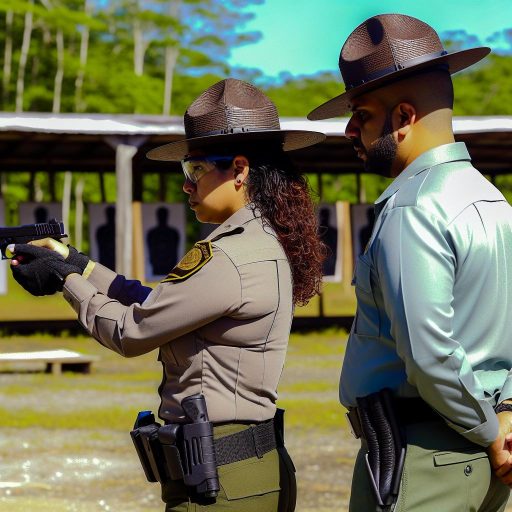Highway patrol operations play a crucial role in ensuring road safety and traffic management.
When we look at the impact of technology on highway patrol operations, we can see significant advancements.
Enhanced Communication
Technology has revolutionized communication for highway patrol officers.
This allows real-time updates and coordination.
Improved Surveillance
The use of cameras, drones, and GPS tracking has enhanced surveillance capabilities.
This aids in monitoring traffic violations.
Efficient Data Management
Technology enables better data collection and storage.
This helps in analyzing trends and improving patrol strategies.
Automated Systems
Automation in ticketing and reporting reduces paperwork.
It also enhances accuracy in record-keeping for patrol officers.
Enhanced Safety Measures
Technology has led to the development of safety tools.
These include spike strips and body cameras for patrol officers.
Improved Training Programs
Virtual reality simulations and online courses have made training more interactive.
This makes it effective for highway patrol officers.
Challenges and Adaptations
Despite the benefits, challenges like cyber threats persist.
Data privacy issues require continuous adaptation and updates in technology.
Technology has positively transformed highway patrol operations.
These advancements make them more efficient and effective in ensuring road safety.
Evolution of Technology in Law Enforcement:
In the past, law enforcement relied on basic tools like radios and vehicles.
The introduction of computers revolutionized how data was stored and analyzed.
Transform Your Career Today
Unlock a personalized career strategy that drives real results. Get tailored advice and a roadmap designed just for you.
Start NowAdvancements in surveillance technology improved monitoring of highways and public spaces.
Body cameras and dash cams enhance transparency and accountability in patrol operations.
GPS systems enable officers to track vehicles and respond to emergencies more efficiently.
The integration of drones provides aerial support for surveillance and search operations.
Automated license plate recognition systems assist in identifying stolen or wanted vehicles.
Mobile fingerprint scanners allow officers to quickly verify identities in the field.
Real-time communication networks facilitate collaboration between different law enforcement agencies.
AI-powered software helps analyze large data sets for identifying patterns and predicting crimes.
Improved Communication Systems:
Technology has revolutionized communication among highway patrol officers.
Real-time communication allows for faster response to emergencies.
Officers can now share information instantly with their colleagues.
Mobile devices enable officers to communicate while on the move.
- Technology has revolutionized communication among highway patrol officers.
- Real-time communication allows for faster response to emergencies.
- Officers can now share information instantly with their colleagues.
- Mobile devices enable officers to communicate while on the move.
Learn More: How to Protect High-Profile Clients
Using Drones in Surveillance:
Drones help patrol officers monitor traffic and detect violations more efficiently.
They provide a bird’s eye view of the highway, aiding in detecting speeding vehicles.
Drones can cover larger distances in a shorter time, enhancing patrol operations.
Advantages of Using Drones for Surveillance:
- Increased Efficiency: Drones can monitor traffic in real-time, leading to quicker response times.
- Cost-Effective: Operating drones is less expensive than deploying helicopters or additional ground units.
- Enhanced Safety: Drones can capture footage of incidents without putting officers at risk.
- Evidence Collection: High-quality footage from drones can be used as evidence in court proceedings.
- Data Analysis: Drones can collect data on traffic patterns, helping in planning future patrol operations.
See Related Content: Technology Used by ICE Agents in Their Work
Implementing License Plate Recognition Technology in Highway Patrol Operations
License plate recognition technology has revolutionized the way highway patrol officers conduct their operations.
License plate recognition technology has significantly enhanced the efficiency of highway patrol operations by allowing officers to quickly scan and identify vehicles on the road.
Showcase Your Business Today
Reach thousands of readers actively exploring professional services. Publish your business profile and grow your audience now.
Publish NowThis technology can quickly capture license plate information of passing vehicles and instantly cross-reference it with a database of stolen vehicles and wanted suspects.
One of the most significant benefits of license plate recognition technology is its ability to quickly identify stolen vehicles.
With this technology in place, officers can easily track down stolen vehicles on the road, increasing the chances of recovering them and apprehending the suspects involved in the crime.
This has led to a significant decrease in the number of successful car thefts and has improved overall public safety.
License plate recognition technology has also proven to be highly effective in identifying wanted suspects who are on the run.
By capturing the license plate information of passing vehicles, officers can quickly determine if the vehicle matches any suspect descriptions in their database.
This has led to a higher success rate in tracking down and apprehending wanted criminals, making our highways safer for all motorists.
Another advantage of license plate recognition technology is its ability to provide real-time alerts and notifications to officers in the field.
When a stolen vehicle or a wanted suspect is identified, officers receive instant notifications on their mobile devices, allowing them to take immediate action.
This feature has proven to be crucial in preventing crimes and ensuring a timely response from law enforcement.
License plate recognition technology can also be seamlessly integrated with other law enforcement systems.
This integration allows officers to access comprehensive information about a vehicle or a suspect with just a few clicks, enhancing their decision-making process and helping them respond effectively to different situations on the road.
The implementation of license plate recognition technology in highway patrol operations has brought about significant improvements in efficiency and effectiveness.
This technology has revolutionized the way officers conduct their operations, enabling them to quickly identify stolen vehicles and wanted suspects, and respond swiftly to potential threats on the road.
As technology continues to advance, we can expect even more enhancements in highway patrol operations, making our highways safer for everyone.
You Might Also Like: Client Onboarding Process for Security Consultants
Impact of Body Cameras on Accountability:
Body cameras have revolutionized the way highway patrol officers conduct themselves during their daily operations.
Behavior of Highway Patrol Officers:
- Body cameras serve as a deterrent for officers to engage in misconduct or unethical behavior.
- Officers are more cautious in their interactions with the public, knowing that their actions are being recorded.
- The presence of body cameras encourages officers to adhere to standard operating procedures and protocols.
- Accountability is increased as officers are held responsible for their actions captured on camera.
- Body cameras promote professionalism and respect in the interactions between officers and civilians.
Increasing Transparency and Accountability in Law Enforcement:
- Body cameras provide irrefutable evidence in case of disputes or complaints against officers.
- Transparency is enhanced as footage from body cameras can be used to review incidents objectively.
- Public trust in law enforcement is bolstered as the actions of officers are documented and available for review.
- Body cameras help to prevent escalation of conflicts and promote peaceful resolutions.
- Officers are more likely to follow proper procedures and protocols when they know they are being recorded.
Body cameras have significantly impacted the behavior of highway patrol officers by promoting transparency and accountability in law enforcement.
The use of body cameras has led to increased professionalism, adherence to protocols, and a higher level of respect in interactions between officers and civilians.
This technology has proven to be a valuable tool in ensuring the integrity and credibility of highway patrol operations.
Explore Further: Role of Cybersecurity Specialists in Remote Work Security

Integration of GPS Technology:
GPS technology is utilized for tracking patrol vehicles and coordinating responses effectively.
GPS technology plays a crucial role in enhancing the efficiency and effectiveness of highway patrol operations.
Advancements in Highway Patrol Operations
One of the most significant advancements in highway patrol operations is the use of data analysis tools for predictive policing.
Utilization of Data Analysis Tools
Highway patrol agencies across the country are now utilizing sophisticated data analysis tools to enhance their operational efficiency.
These tools allow agencies to analyze vast amounts of data from various sources, such as traffic incidents, criminal activities, and weather conditions.
By leveraging data analysis tools, highway patrol officers can identify patterns and trends that may indicate potential criminal activities or hazardous conditions on the road.
Role of Predictive Analytics
One of the key applications of data analysis tools in highway patrol operations is predictive analytics.
Predictive analytics involves using historical data to predict future events, such as identifying high-crime areas or predicting where accidents are likely to occur.
By analyzing past incidents and patterns, highway patrol agencies can allocate their resources more effectively and proactively prevent crimes and accidents.
Identifying High-Crime Areas
Predictive policing helps highway patrol officers identify high-crime areas where increased law enforcement presence may be needed.
By analyzing crime data, traffic patterns, and other relevant information, agencies can pinpoint specific locations that require targeted enforcement efforts.
This proactive approach allows officers to deter criminal activities and improve public safety in high-risk areas.
Preventing Accidents
Another important aspect of predictive policing in highway patrol operations is preventing accidents on the road.
By analyzing historical traffic data, weather conditions, and other factors, agencies can identify areas prone to accidents and implement measures to prevent them.
For example, officers can increase patrols in accident-prone zones, conduct safety awareness campaigns, or make infrastructure improvements to enhance roadway safety.
Data analysis tools and predictive analytics play a crucial role in improving highway patrol operations by enabling agencies to make informed decisions, allocate resources efficiently, and prevent crimes and accidents effectively.
Training and Adaptation to Technological Changes:
Training of highway patrol officers is crucial in utilizing new technologies effectively.
Officers need to stay updated on the latest tools and techniques for efficient operations.
Challenges in training include resistance to change and the learning curve associated with new technologies.
Showcase Your Business Today
Reach thousands of readers actively exploring professional services. Publish your business profile and grow your audience now.
Publish NowOpportunities lie in enhancing officer efficiency, accuracy, and overall performance through technology.
Continuous training ensures officers are equipped to handle emerging technologies and evolving threats.
Highway patrol agencies must invest in comprehensive training programs for their officers.
- Training should cover a wide range of technologies, from GPS systems to body cameras.
- Simulations and hands-on practice sessions are essential to familiarize officers with new tools.
- Regular workshops and refresher courses help officers keep up with advancements in technology.
- Training should also emphasize data security and proper handling of sensitive information.
- By investing in training, agencies can ensure officers are proficient in using technology to their advantage.
Adapting to technological changes can present both challenges and rewards for highway patrol officers.
- One of the main challenges is overcoming the resistance to embracing new technologies.
- Some officers may prefer traditional methods and be hesitant to adopt new tools.
- Training programs should address this resistance and help officers see the benefits of technology.
- Opportunities arise when officers embrace technology and leverage it to improve their workflow.
- New tools can streamline processes, enhance communication, and increase overall effectiveness on the job.
Highway patrol officers need to be adaptable and open to learning in a rapidly changing technological landscape.
- Agencies should foster a culture that encourages innovation and experimentation with new technologies.
- Flexibility and willingness to adapt are key traits for officers facing new challenges.
- Collaboration among officers and sharing best practices can help in adapting to technological changes.
- Agencies should provide ongoing support and resources to help officers navigate technology transitions.
- Ultimately, officers who embrace technology and adapt to changes will be better equipped to fulfill their duties.
Technology has revolutionized highway patrol operations.
Real-time information, communication, and data analytics make patrolling more efficient.
Improved safety measures, crime prevention, and response time are evident benefits.
Enhanced surveillance capabilities aid in monitoring traffic violations and criminal activities.
The use of drones, body cameras, and GPS tracking systems have transformed policing.
Automation of administrative tasks allows officers to focus on critical duties.
Technology has significantly improved the effectiveness and performance of highway patrol operations.
Additional Resources
Border Patrol History | U.S. Customs and Border Protection
Career Opportunities – Florida Department of Highway Safety and …
[E-Books for Sale]
The Big Book of 500 High-Paying Jobs in America: Unlock Your Earning Potential
$19.99 • 500 High-Paying Jobs • 330 pages
Explore 500 high-paying jobs in America and learn how to boost your career, earn more, and achieve success!
See All 500 High-Paying Jobs of this E-Book
1001 Professions Without a Degree: High-Paying American Jobs You Can Start Now
$19.99 • 1001 Professions Without a Degree • 174 pages
Discover 1001 high-paying jobs without a degree! Unlock career tips, skills, and success strategies for just $19.99!




